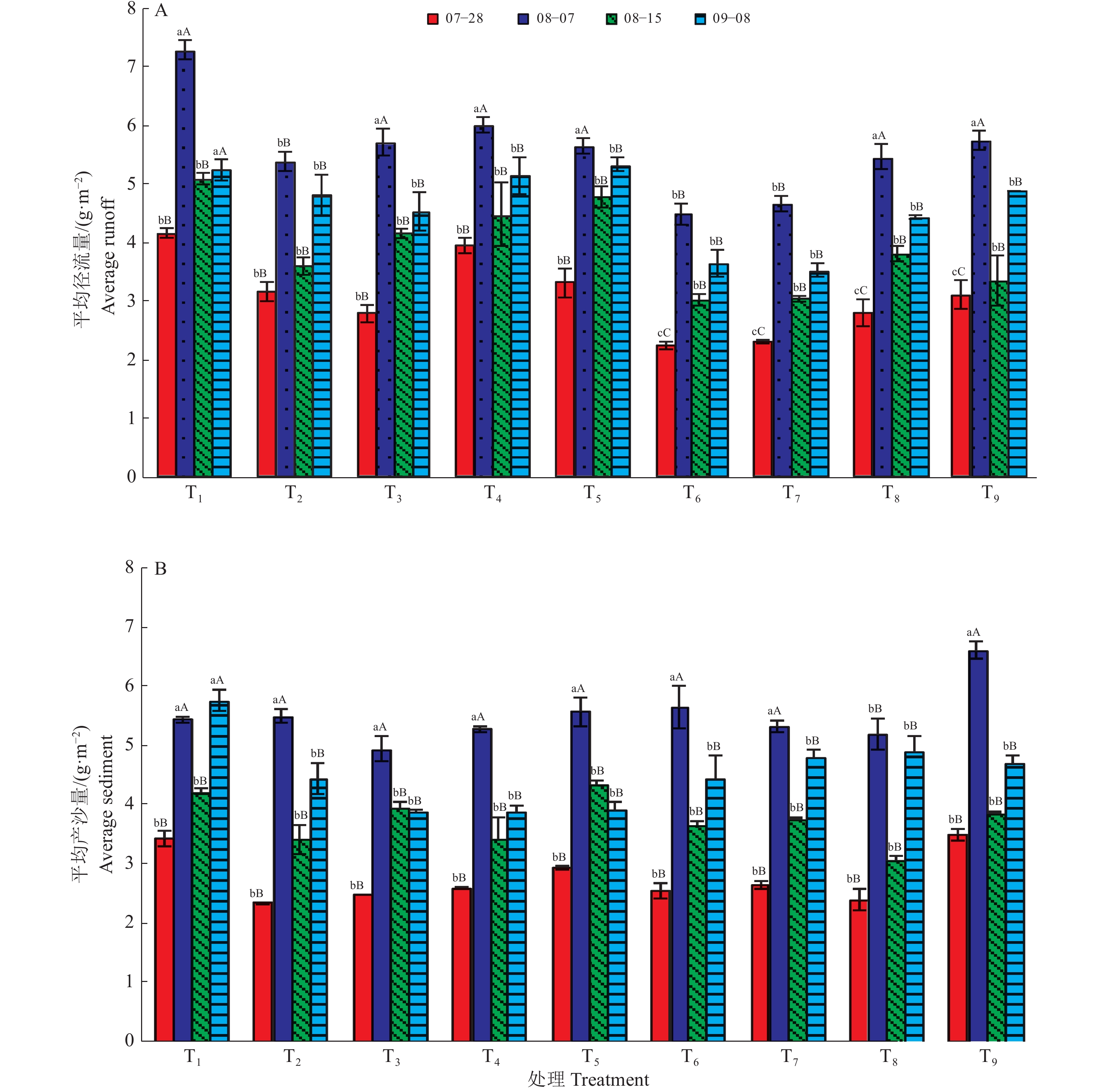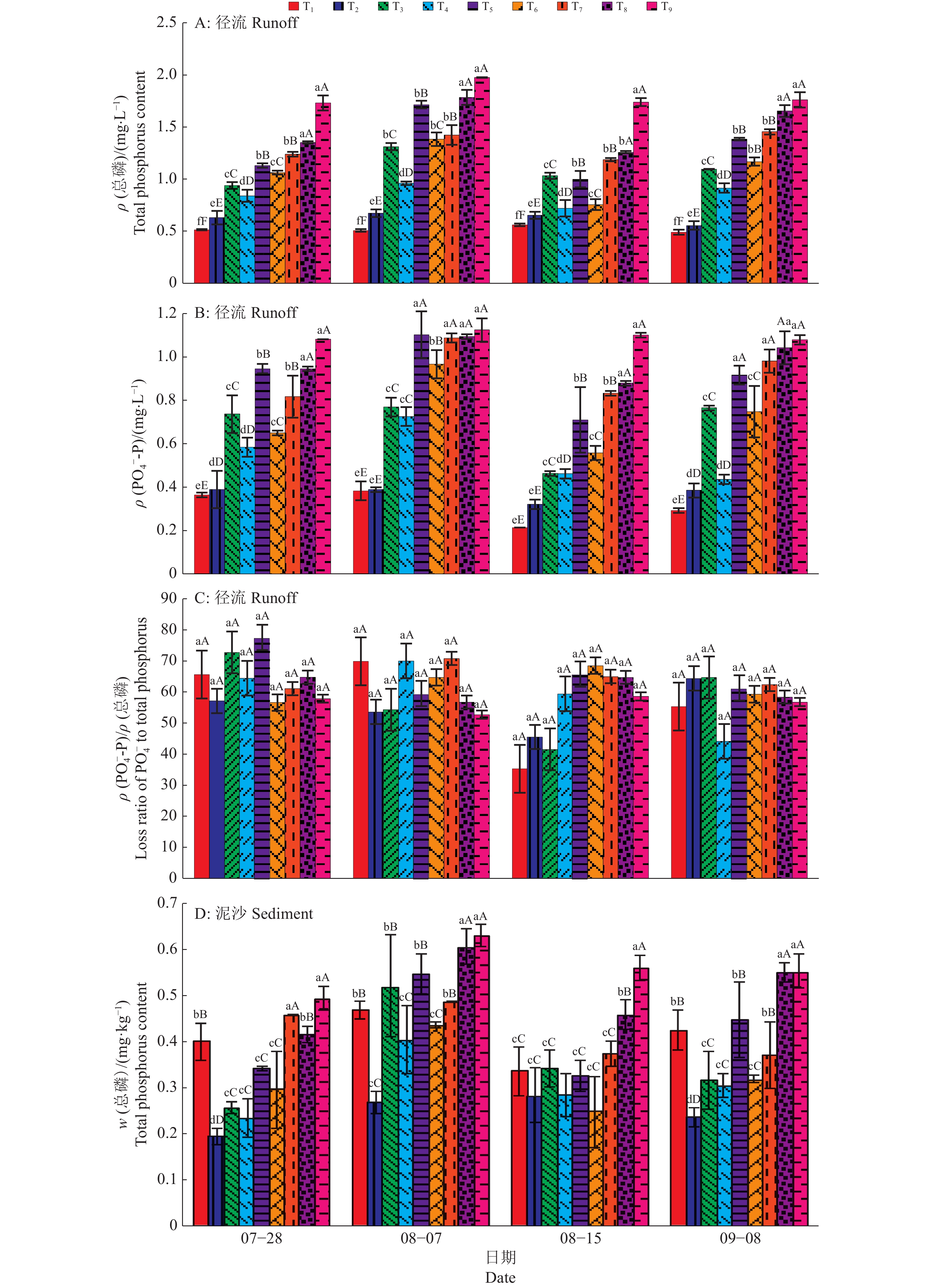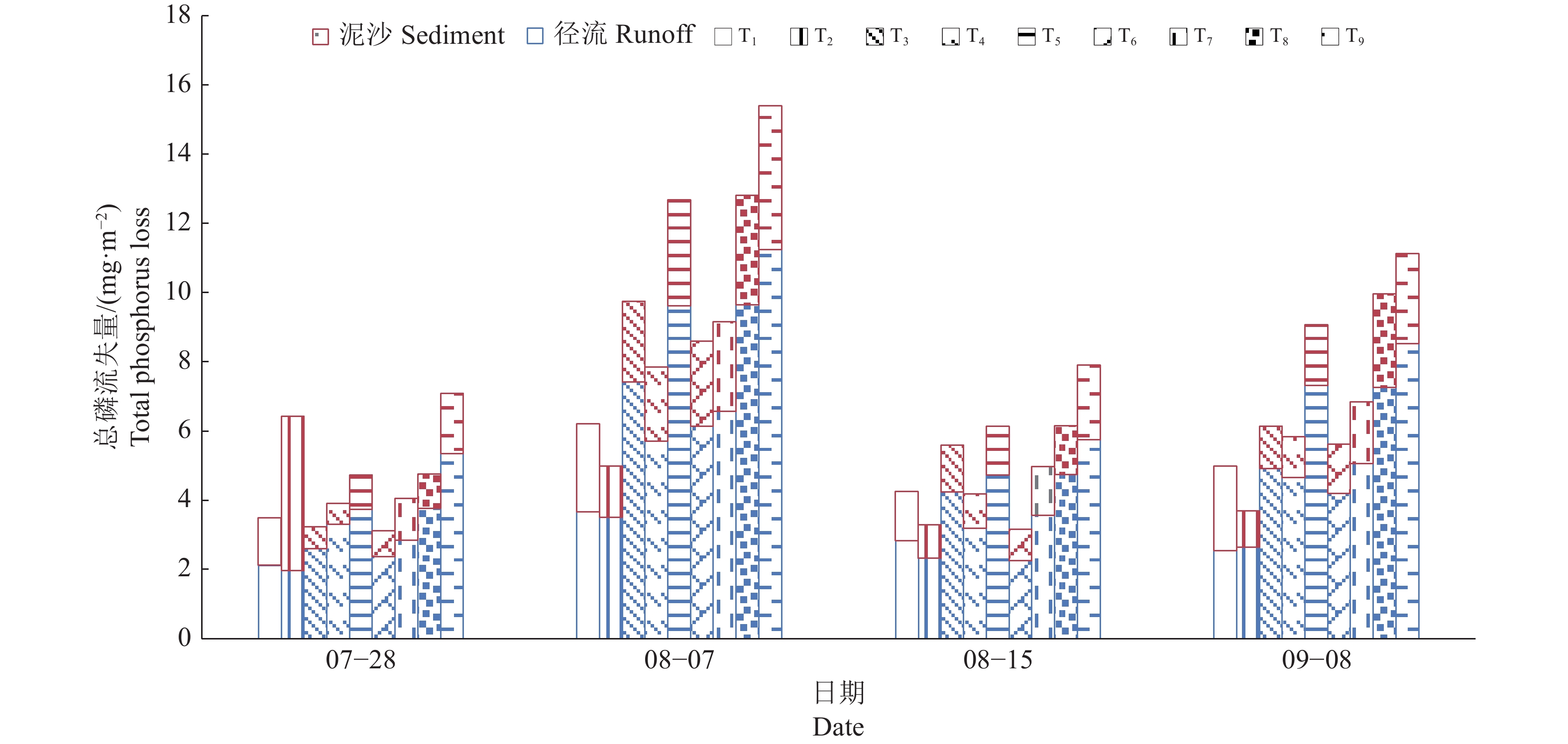Effects of straw compost retting on runoff, sediment and phosphorus loss from sloping farmland
-
摘要:目的
寻求不同堆沤方式和秸秆还田密度结合下较为有效的径流泥沙与磷素减排农艺措施。
方法在自然降水条件下,研究不同秸秆还田密度(0.75、1.5 kg·m−2)、不同秸秆粉碎粒度(1、5 cm)、加水或尿素堆沤对滇中二龙潭小流域烟草坡耕地产流产沙量及磷素流失量的影响。
结果1.5 kg·m−2秸秆密度、5 cm秸秆粒度、加水堆沤均可有效降低烟草坡耕地产流产沙量,降低幅度分别为18.59%~38.60%、12.50%~38.60%、10.06%~38.60%;0.75 kg·m−2秸秆密度、5 cm秸秆粒度、加水堆沤较1.5 kg·m−2秸秆密度、1 cm秸秆粒度、加水与尿素堆沤的处理,径流泥沙总磷与径流PO4−-P浓度分别降低2.82%~66.67%、0.38%~57.53%和1.97%~64.73%;径流中PO4−-P占总磷浓度的35.30%~77.59%;0.75 kg·m−2秸秆密度、5 cm秸秆粒度及加水堆沤可有效减少坡耕地磷素流失风险,径流和泥沙总磷流失量分别最高降低63.64%和64.74%、63.89%和57.87%、63.89%和64.74%。
结论采用0.75 kg·m−2秸秆密度、5 cm秸秆粒度以及加水堆沤处理还田可控制滇中地区磷素流失,降低坡耕地径流泥沙及磷素流失风险。
Abstract:ObjectiveTo seek more effective agronomic measures to reduce runoff, sediment and phosphorus loss emissions under the combination of different stacking methods and straw returning densities.
MethodUnder the conditions of natural rainfall, different straw returning densities (0.75, 1.5 kg·m−2), different straw crushing particle sizes (1, 5 cm), adding water or urea were designed to study the effects on runoff and sediment amount, and phosphorus loss of slope farmland in the middle of Yunnan.
ResultThe straw density of 1.5 kg·m−2, straw particle size of 5 cm, and water retting could effectively reduce the runoff and sediment yield of tobacco slope farmland by 18.59%–38.60%, 12.50%–38.60%, 10.6%–38.60%. Compared with the treatments of 1.5 kg·m−2 straw density, 1 cm straw particle size, and water and urea retting, 0.75 kg·m−2 straw density, 5 cm straw particle size, and water-added could decrease runoff and sediment total phosphorus and runoff PO4−-P concentration by 2.82%–66.67%, 0.38%–57.53% and 1.97%–64.73% respectively. The ratio of PO4−-P in runoff was 35.30%–77.59% of the total phosphorus concentration. Straw density of 0.75 kg·m−2, straw particle size of 5 cm, and water retting could effectively reduce the risk of phosphorus loss in tobacco sloping farmland in Erlongtan small watershed. The total phosphorus loss in runoff and sediment respectively highestly reduced 63.64% and 64.74%, 63.89% and 57.87%, 63.89% and 64.74%.
ConclusionThe use of 0.75 kg·m−2 straw density, 5 cm straw particle size and water retting treatment can control phosphorus loss in central Yunnan watershed and reduce the risk of runoff, sediment and phosphorus loss on slope farmland.
-
Keywords:
- Sloping farmland /
- Straw returning /
- Phosphorus loss /
- Compost method /
- Sediment /
- Runoff
-
-
图 1 4场降水中不同处理产流、产沙特征
各小图中柱子上不同的小写字母表示同一降水不同处理之间差异显著,不同的大写字母表示同一处理不同降水之间差异显著(P<0.05,LSD法)
Figure 1. Runoff and sediment characteristics under four rainfalls in different treatments
Different lowercase letters on the columns in each figure indicate significant differences among different treatments under the same rainfall, different capital letters indicate significant differences among different rainfalls under the same treatment (P<0.05, LSD method)
图 2 4场降水中不同处理对径流总磷、PO4−-P流失量及其比值与泥沙总磷流失量的影响
各小图中柱子上不同的小写字母表示同一降水不同处理之间差异显著,不同的大写字母表示同一处理不同降水之间差异显著(P<0.05,LSD法)
Figure 2. Effect of different treatments on the loss of total phosphorus、PO4−-P and loss ratio of PO4−-P to total phosphorus in runoff and total phosphorus loss in sediment under four rainfours
Different lowercase letters on the columns in each figure indicate significant differences among different treatments under the same rainfall, different capital letters indicate significant differences among different rainfalls under the same treatment (P<0.05, LSD method)
表 1 肥料施用情况
Table 1 Fertilizer details
种类 Species N∶P∶K1) 施用量/(kg·hm−2) Fertilization dosage 总量 Total N P 底肥 Base fertilizer 12∶6∶24 247.5 29.7 14.85 提苗肥 Seedling fertilizer 28∶0∶5 45.0 12.6 0 追肥 Additional fertilizer 12∶6∶24 772.5 92.7 46.35 1)复合肥中的氮磷钾质量比
1)The mass ratio of nitrogen, phosphorus and potassium in compound fertilizer表 2 各样方处理方式及施肥量
Table 2 Treatment and fertilization dosage of different plots
处理
Treatment施肥量/(g·m−2)
Fertilization dosage秸秆还田量/(g·m−2)
Straw-returned amount秸秆粉碎
程度/cm
Degree of
straw crushing秸秆堆沤添加
尿素量/(g·m−2)
Straw compost urea
addition amount基肥
Base fertilizer提苗肥
Seedling fertilizer追肥
Additional fertilizer折合磷
Pure phosphorus还田量
Straw-returned amount折合磷
Pure phosphorus施用量
Fertilization dosage折合磷
Pure phosphorusT1 70 13 214 17.04 0 0 0 0 0 T2 70 13 214 17.04 750 2.025 5 0 0 T3 70 13 214 17.04 750 2.025 5 3.75 0.01 T4 70 13 214 17.04 750 2.025 1 0 0 T5 70 13 214 17.04 750 2.025 1 3.75 0.01 T6 70 13 214 17.04 1500 4.050 5 0 0 T7 70 13 214 17.04 1500 4.050 5 3.75 0.01 T8 70 13 214 17.04 1500 4.050 1 0 0 T9 70 13 214 17.04 1500 4.050 1 3.75 0.01 -
[1] 张思毅, 梁志权, 谢真越, 等. 植被调控红壤坡面土壤侵蚀机理[J]. 水土保持学报, 2016, 30(3): 1-5. [2] 孙佳美, 余新晓, 樊登星, 等. 模拟降雨下植被盖度对坡面流水动力学特性的影响[J]. 生态学报, 2015, 35(8): 2574-2580. [3] YANG J L, ZHANG G L, SHI X Z, et al. Dynamic changes of nitrogen and phosphorus losses in ephemeral runoff processes by typical storm events in Sichuan Basin, Southwest China[J]. Soil & Tillage Research, 2009, 105(2): 292-299.
[4] ARONSSON H, HANSEN E M, THOMSEN I K, et al. The ability of cover crops to reduce nitrogen and phosphorus losses from arable land in southern Scandinavia and Finland[J]. Journal of Soil and Water Conservation, 2016, 71(1): 41-55. doi: 10.2489/jswc.71.1.41
[5] MANDAL S, GOSWAMI A R, MUKHOPADHYAY S K, et al. Simulation model of phosphorus dynamics of an eutrophic impoundment-East Calcutta wetlands, a Ramsar site in India[J]. Ecological Modelling, 2015, 306: 226-239. doi: 10.1016/j.ecolmodel.2014.07.008
[6] AMAYA A, MEDERO N, TANCREDI N, et al. Activated carbon briquettes from biomass materials[J]. Bioresource Technology, 2007, 98(8): 1635-1641. doi: 10.1016/j.biortech.2006.05.049
[7] SOLTANGHEISI A, RODRIGUES M, COELHO M J A, et al. Changes in soil phosphorus lability promoted by phosphate sources and cover crops[J]. Soil & Tillage Research, 2018, 179: 20-28.
[8] MALTAIS-LANDRY G, FROSSARD E. Similar phosphorus transfer from cover crop residues and water-soluble mineral fertilizer to soils and a subsequent crop[J]. Plant and Soil, 2015, 393(1/2): 193-205.
[9] 孙倩倩, 王正银, 赵欢, 等. 定位施磷对紫色菜园土磷素状况的影响[J]. 生态学报, 2012, 32(8): 2539-2549. [10] 黄琴. 作物秸秆还田对土壤养分含量的影响[J]. 石河子大学学报(自然科学版), 2006(3): 277-279. [11] 韩瑞芸, 陈哲, 杨世琦. 秸秆还田对土壤氮磷及水土的影响研究[J]. 中国农学通报, 2016, 32(9): 148-154. doi: 10.11924/j.issn.1000-6850.casb15090097 [12] 王静, 郭熙盛, 王允青, 等. 秸秆还田对稻田磷素径流损失的影响[J]. 安徽农业科学, 2013, 41(13): 5761-5763. doi: 10.3969/j.issn.0517-6611.2013.13.045 [13] 侯红波, 刘伟, 李恩尧, 等. 不同覆盖方式对红壤坡耕地氮磷流失的影响[J]. 湖南生态科学学报, 2019, 6(1): 16-20. doi: 10.3969/j.issn.2095-7300.2019.01.003 [14] 王志荣, 梁新强, 隆云鹏, 等. 化肥减量和秸秆还田对油菜地磷素地表径流的影响[J]. 浙江农业科学, 2019, 60(2): 203-207. [15] 国家环境保护局标准处. 水质 总磷的测定 钼酸铵分光光度法: GB 11893—1989[S]. 北京: 中国标准出版社, 1989. [16] 中华人民共和国农业部种植业管理司. 植株全磷含量测定 钼锑抗比色法: NY/T 2421—2013[S]. 北京: 中国农业出版社, 2013. [17] 中华人民共和国农业部种植业管理司. 土壤检测 第24部分: 土壤全氮的测定 自动定氮仪法: NY/T 1121.24—2012[S]. 北京: 中国农业出版社, 2012. [18] 李裕元. 坡地磷素迁移研究进展[J]. 水土保持研究, 2006(5): 1-4. doi: 10.3969/j.issn.1005-3409.2006.05.001 [19] 杨茜, 蒋珍茂, 石艳, 等. 低分子量有机酸对三峡库区消落带典型土壤磷素淋溶迁移的影响[J]. 水土保持学报, 2015, 29(1): 126-131. [20] 李宗新, 董树亭, 王空军, 等. 不同施肥条件下玉米田土壤养分淋溶规律的原位研究[J]. 应用生态学报, 2008(1): 65-70. [21] 李太魁, 张香凝, 郭战玲, 等. 覆盖与间作对丹江口库区坡地茶园氮磷流失和土壤环境的影响[J]. 生态环境学报, 2020, 29(3): 543-549. [22] 张奇, 陈粲, 陈效民, 等. 不同深度秸秆还田对黄棕壤氮素和微生物生物量碳氮的影响[J]. 水土保持通报, 2019, 39(2): 56-61. [23] 杨坤宇, 王美慧, 王毅, 等. 不同农艺管理措施下双季稻田氮磷径流流失特征及其主控因子研究[J]. 农业环境科学学报, 2019, 38(8): 1723-1734. doi: 10.11654/jaes.2019-0609 [24] 杨珏, 阮晓红. 土壤磷素循环及其对土壤磷流失的影响[J]. 土壤与环境, 2001(3): 256-258. [25] 韩晓飞, 高明, 谢德体, 等. 减磷配施有机肥对紫色土旱坡地磷素流失的消减效应[J]. 环境科学, 2016, 37(7): 2770-2778. [26] 徐泰平, 朱波, 汪涛, 等. 秸秆还田对紫色土坡耕地养分流失的影响[J]. 水土保持学报, 2006(1): 30-32. doi: 10.3321/j.issn:1009-2242.2006.01.007 [27] 郑海金, 胡建民, 黄鹏飞, 等. 红壤坡耕地地表径流与壤中流氮磷流失比较[J]. 水土保持学报, 2014, 28(6): 41-45. [28] LI L, DAVIS A P. Urban stormwater runoff nitrogen composition and fate in bioretention systems[J]. Environmental Science & Technology, 2014, 48(6): 3403-3410.
[29] 陈欣, 王兆骞, 杨武德, 等. 红壤小流域坡地不同利用方式对土壤磷素流失的影响[J]. 生态学报, 2000(3): 374-377. doi: 10.3321/j.issn:1000-0933.2000.03.004 [30] 尚念杰, 张玉涛. 有机厩肥不同施用量调控中等肥力土壤烤烟生产研究[J]. 耕作与栽培, 2018(4): 8-11. [31] 王瑞, 刘继忠. 禄丰县高原特色农业发展浅析[J]. 云南农业, 2016(11): 12-14. doi: 10.3969/j.issn.1005-1627.2016.11.006 [32] 朱利群, 夏小江, 胡清宇, 等. 不同耕作方式与秸秆还田对稻田氮磷养分径流流失的影响[J]. 水土保持学报, 2012, 26(6): 6-10.




 下载:
下载:


